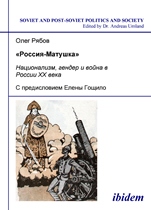«Россия-Матушка»: Национализм, гендер и война в России XX века
О.В. Рябов
 Оглавление
Оглавление
«Россия-Матушка» – один из наиболее известных символов русскости в России и за рубежом. Будучи важным концептом русского национализма, он выполняет функцию «символического пограничника» между Россией и Западом.
В монографии исследуется история «России-Матушки» в XX веке, в том числе использование этого символа в основных военных конфликтах столетия (русско-японская война, Первая и Вторая мировые войны, Гражданская война, Холодная война). Книга показывает роль мифологии России-Матушки в определении русскости, в продуцировании Своих и Чужих, в конструировании внутренних и внешних Врагов, в легитимации и делегитимации власти, в поддержании и корректировке гендерного порядка в России. Исследование анализирует дискурсивную борьбу вокруг материнского символа России в различных направлениях русского национализма, которая обусловливает полисемантичность этого символа и гетерогенность национальной идентичности в целом. В отличие от других публикаций о «России-Матушке», эта книга рассматривает данный символ в кросс-культурном контексте, интерпретируя его через призму дискурса Модерности, делящего мир на «Запад и Все Остальное» .
‘Mother Russia': Nationalism, Gender, and War in XXth Century Russia
Oleg Riabov
The monograph is devoted to ‘Mother Russia' as a principal concept of Russian nationalism. The volume demonstrates the role of the mythology of ‘Mother Russia' in inventing and reinventing Russianness, in producing Ours and Theirs, in constructing external and internal Enemies, in legitimating and delegitimating power in political system in Russia.
Chapter I ‘Nationalism, Gender, and War: Methodological Framework' focuses on the methodological approaches of the study. It starts with definitions of its key terms – gender, nationalism, identity, and discourse. Interpreting gender as a referential, context-dependent and heterogeneous phenomenon, showing its implication in power relations, the author demonstrates that all principal concepts of nationalism as a discursive formation intersect with gender discourse. It is provided on the one hand, by the role of nationalism in formation of gender order of Modernity, and, on the other hand, by ability of gender to serve as a very effective marker enabling the process of inclusion and exclusion in making of collective identity. The author argues that gender discourse serves as a weapon of war, playing an important role in national mobilization, as well as in the proving of supremacy in war, both military and moral.
The aim of Chapter II ‘'Mother Russia' through the lenses of postcolonial studies' is a general explanation of the symbol. ‘Mother Russia' is rooted in a myth-symbol complex of Russian culture. At the same time it has been developed under the influence of the discourse on Modernity which has divided the world into ‘the West and the Rest' . In the Western culture ‘Mother Russia' serves as a ‘symbolic border-guard' between ‘masculine' West and ‘feminine' Russia . ‘Mother Russia' keeps functioning as a factor of the identity of the West in the post-Cold War era; contemporary Western mass media actively exploits this symbol to mark a border of the West and to designate Russia as irrational, archaic, chaotic, mysterious, unpredictable, passive.
In Russian culture the development of ‘Mother Russia' is a reaction on these practices of her othering in Western discourse to a considerable extent. The idea of the femininity of Russia is accepted, first of all, in the ‘messianic' discourse, which treats Russia as the savior of the West and of all humankind. The author shows that some other non-Western cultures use the similar ‘authofeminization', which is accompanied by representation of the Western civilization as extreme masculine, ‘dangerous masculine'.
The symbol is exploited in the politics of identity of Russian nationalism to provide unity of Russian nation. Determining Ours, discourse on Mother Russia also produces Enemies both in national and gender dimensions.
Chapter III ‘'Mother Russia' in the history of XX century' analyzes the major phases of development of the symbol during the last century, focusing on its functions in the wars (including Russo-Japanese war, First and Second World Wars, and Cold War), revolutions and civil conflicts.
The author concentrates on the mutual influence of ‘Mother Russia', on the one hand, and national, military, political, imperial, and gender discourses in Russia , on the other hand. The study shows how various discourses within and outside Russia contest for the interpretation of ‘Mother Russia' so that to speak on behalf of her. This discursive struggle around the maternal image of Russia provides polysemy of this symbol and heterogeneity of national identity in general.
http://shop.strato.de/epages/Store8.sf/de_DE/?ObjectPath=/Shops/61235722/Products/978-3-89821-487-2
http://www.amazon.com/Rossiia-Matushka-Natsionalizm-Post-Soviet-Politics-Society/dp/3898214877